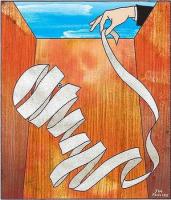By Dr Graham Thom, refugee policy expert for Amnesty International
What is happening on Nauru is an affront to humanity. People who asked for our help are being broken. On Friday I returned home after four days on Nauru as an independent assessor of conditions for asylum seekers wishing to come to Australia. I find it difficult to understand why nearly 400 asylum seekers have been sent there, ostensibly in the name of saving lives. The men we met at the Nauru Top Side Camp certainly couldn't understand why they had ended up on a rocky outcrop in the middle of the jungle, in a country they had never heard of. They were distressed and the conditions were already taking their toll.
For people seeking our protection, the accommodation is totally inappropriate. There were 14 men sharing the large tents, and five in smaller tents where there was little room inside to do anything but attempt sleep. The oppressive heat and humidity made staying in the tents during the day impossible. When it rained, tents leaked, forcing men to sleep on soaking beds. They showed us painful skin conditions caused by the heat and damp. On average 85 people a day visit the medical facility.
Outside the tents the rocky ground exacerbated the heat. With little shade, the men hung around the camp perimeter where the encroaching jungle provided some relief. If or when construction of a permanent processing centre begins, it will be just metres from their tents, claiming more of the little open space they now have to move around in. The noise and the dust created from construction, added to that from the nearby phosphate mining, will be horrific.
Considerable money has been spent getting the camp ready since the Australian government's September decision to send asylum seekers to Nauru for offshore processing. While the medical centre and basic offices were in place, the ''appropriate accommodation'' as outlined in the
independent expert panel report could not be completed in time. That's why these men are living in tents. And problems remain with building permanent structures on Nauru for visa processing, due to the complexity for the government of trying to lease land from the local landowners.
Plans to allow freedom of movement for those on the island, another prerequisite from the expert panel headed by former Defence chief Angus Houston, have also been complicated. While in theory the detainees are allowed out of the camp between 7am and 7pm, they must be monitored at all times. There is simply no privacy for them anywhere; nowhere to get a moment's peace or to grieve for a family member recently killed. They told us: ''We came seeking safety, we are not criminals, why are we being treated like criminals?'' Both the expert panel and the Nauruan government said these men should be leading as normal a life as possible. Yet this is a far cry from a normal life.
The Nauru Top Side Camp is in the middle of the island, surrounded by jungle and phosphate mining; to leave, the men must be taken by bus. This places further restrictions on their freedom of movement.
Remember, these are people who came to Australia seeking our protection. A question we were asked repeatedly was: ''When will my processing begin?'' While it is now clear this will be done under Nauruan law, it is also clear Nauru does not have the capacity. Specialists will need to be hired and accommodation will need to be found. With only two hotels on Nauru, accommodation is a problem for everyone. Most of the staff are sharing tents or hotel rooms, making working conditions far from ideal when dealing with highly distressed people.
Experience has shown us that improvements will take time - and the longer it takes, the greater the sense of injustice.
We still don't have answers to some fundamental questions. Why were these men taken to Nauru before appropriate accommodation had been built, before leases had been granted by local landowners, before processing arrangements had been finalised, before staff were hired and accommodation found, and before the visa conditions allowing freedom of movement had been put in place?
Negotiations with the Nauruan government on several issues are continuing.
But the decision to send vulnerable men to Nauru without finalising such basic, fundamental issues is not only extraordinarily ill-conceived but cruel.
Detainees said to us: ''What is the point of keeping us here when everyone else will be processed in Australia. It doesn't make sense. What have we done. Why us?''
I agree that it makes no sense at all. The damage we are causing to their physical and mental health is already apparent. History has shown that most will be found to be refugees. While Australian taxpayers foot the bill to keep them hostage on Nauru in the vain hope it will send a
signal to others fleeing war and violence not to come, ultimately, after up to five years of living in squalor, they will be brought here, broken. They are then expected to rebuild their lives. Lives we have wasted.
Offshore processing will only serve to break vulnerable people who have fled unimaginable circumstances. These individuals should be processed in Australia, in accordance with our international obligations. It is time the Australian government stops playing politics with the lives of these men. They deserve better.

